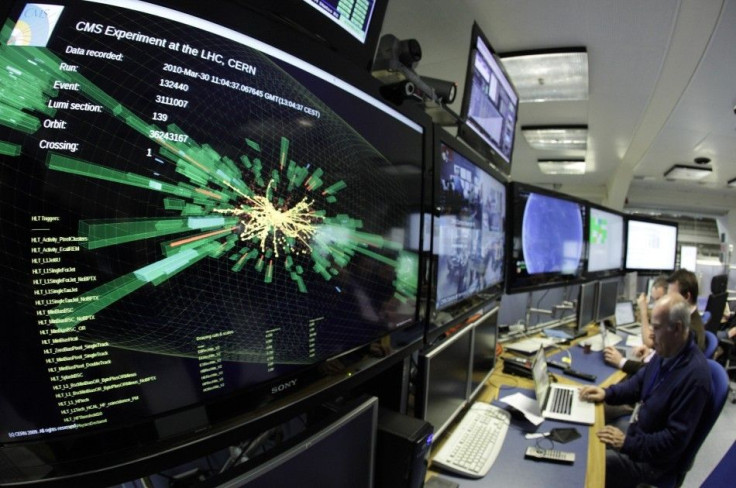God Particle Found? Rumors of Higgs Boson Discovery Ahead of CERN Meeting

Rumors amid physics researchers are running high. A forthcoming seminar at CERN, the European Organization for Nuclear Research in Geneva, on Tuesday could bring the announcement that everyone in the physics community has been waiting for: the discovery of the Higgs boson or God particle.
At least that's what the rumor.
Those in the particle-physics community and a trusted source claim that researchers are closing in on the elusive Higgs boson, PhysicsWorld.com reported. Researchers predict the particle, still hypothetical, will connect and fundamental questions of particle physics and how the world operates at the sub-atomic level.
The details are head-spinningly technical.
The latest rumour is that both ATLAS and CMS have evidence that the Higgs mass is about 125 GeV/C2 at confidence levels of 3.5σ and 2.5σ respectively. At 3.5σ, the measurement could be the result of a random fluke just 0.1% of the time whereas at 2.5σ the fluke factor is about 1%, PhysicsWorld.com reported.
The report points out that while researchers are completely confident in their measurements, their results have a slim chance of coming from a fluke.
That report noted that blogger Lubos Motl managed to reproduce what he claims to be an e-mail from CERN Director General Rolf-Dieter Heuer that invites CERN staff to a briefing on Tuesday that will include progress being made in the search for the Higgs boson.
On Tuesday, CERN issued a press release on its Web site stating that they will be holding seminar on Tuesday during which researchers working on ATLAS and CMS particle physics experiments will make a presentation of their search for the Standard Model Higgs boson.
These results will be based on the analysis of considerably more data than those presented at the summer conferences, sufficient to make significant progress in the search for the Higgs boson, but not enough to make any conclusive statement on the existence or non-existence of the Higgs, the press release stated.
The release also noted that the auditorium that will house the seminar is reserved for CERN personnel and researchers from the laboratory's user community. However, there will be a video stream that will be sent to another auditorium in which scientists will be available to answer questions.
The CERN press release also noted that its management and the representatives of the two experiments will be available to take questions from the media.
The physicists working at the Large Hadron Collider, a particle accelerator at CERN Laboratory in Switzerland, slam numerous particles together in order to break them into never-before-seen pieces. They are hoping to find the God particle, which they believe gives mass to everything in the universe.
As previously reported by the International Business Times, Dr. Alan Barr, the physics coordinator for the ATLAS UK collaboration, has also said that the meeting next week was likely to produce an intermediate result, but nothing conclusive. He did add however that there could be some surprises.
It is anticipated there may be some interest in this because we collected five times more data this year than we anticipated, Barr said. This is enough to give pointers of what is happening -- whether there is a Higgs boson, there is no Higgs boson, or there is something completely different, and even more interesting.
The Higgs boson has been the greatest riddle in all of physics. Some say it may hold the key to understanding the evolution of the universe from its birth.
CERN scientists reported a glimpse of the Higgs boson particle back in July. However, those signals since faded. But researchers said they still hope they will either find the particle by the end of 2012 or confirm that the particle doesn't exist in the form proposed by the Standard Model that brings together elementary physical forces.
I think it has always been a possibility that the Higgs would not be there but I don't think we are ready to say that at this moment, physicist Howard Gordon, deputy U.S. ATLAS operations program manager, told Agence France-Presse in August.
© Copyright IBTimes 2024. All rights reserved.






















